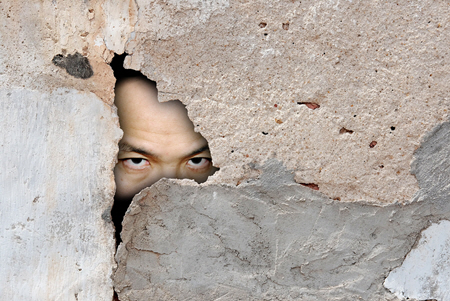“My past is an armor I cannot take off, no matter how many times you tell me the war is over.”
– Unknown
 “I want to get back to feeling like myself again!”
“I want to get back to feeling like myself again!”
That is the cry of many who have the condition of unprocessed trauma that we call Post-Traumatic Stress Disorder, or PTSD.
A zebra on the savannah can escape the clutches of a lion without permanently suffering from the experience. A wild animal’s nervous system has evolved reliable ways to shake off trauma.
Human beings have lost easy access to their own built-in trauma-healing capabilities. PTSD is an invisible wound that will not heal on its own.
“It’s happening again…!”
When stressful experiences occur, our bodies, like the zebra’s, have a natural way of managing and recovering. However, when overloaded and when the nervous system cannot tolerate stress, this natural system breaks down and traps unprocessed trauma in the nervous system.
Certain people, places, things, intrusive thoughts, memories, sensory experiences, and other triggers can reactivate the trauma so that it almost feels like it’s happening again. And every time you relieve it, it can affect your sense of safety, self-esteem, trust, power/control, and intimacy.
Sometimes, people can get used to a diminished version of themselves, all the time knowing that there is something wrong – and hoping that maybe one day it will get better.
But it doesn’t, and the days drag on, repeating their monotony much like in the movie, Groundhog Day. That old spark or zest for life just is not there anymore. You may feel as though you’ll never get it back.
But it’s possible.
 And you can – through therapy.
And you can – through therapy.
The condition we now call PTSD has existed throughout history, and cultures have tried to find ways of explaining and managing it.
Most frequently associated with veterans returning home from war, PTSD appears as historically documented cases of battle fatigue from ancient times right up through the 19th, 20th, and 21st centuries.
History can have a skewed lens and is not as good at documenting the enormous variety of other sources of PTSD, including sexual and countless other sources of trauma. Only in the past few decades have we discovered that we can trace many mental health conditions back to trauma.
Though we have many psychological treatments for depression, anxiety, insomnia, addiction, obsession, anger issues, etc., they often consider trauma the origin of the condition.
However, we’re now lucky to have developed so many effective ways of helping people recover from PTSD and other trauma-related conditions. In trauma therapy, the goal is not to wipe out the memory but to detach it from the painful emotions. Even if you don’t have a clear memory of the trauma, you can still experience relief through therapy.
How does it work?
The trauma wants to reach equilibrium in the heart, brain, and body so that memories no longer hold the same high level of emotional power they did when trapped in the wrong place in your nervous system.
It’s important to gather a history of possible trauma before deciding on the best treatment. Reaching out for help is the first step in what can be a wonderful and enriching road to recovery.
When other avenues haven’t worked to get rid of trauma’s residue, you need the help of a skilled and experienced therapist. The right therapist can provide the framework to help facilitate the realignment of heart, mind, and body and facilitate the natural healing process.
Reach out today – let’s begin your journey toward freedom!

